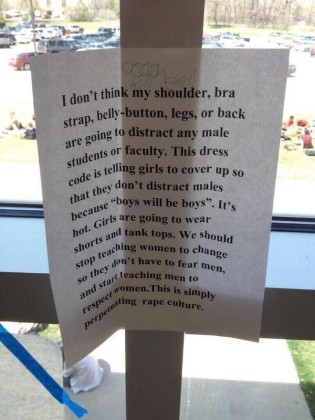We live in a culture that tells boys it’s OK to shed clothing in the heat in order to be more comfortable, but tells girls that their comfort is secondary to how others perceive them.
If you’re a teenage girl, you may have seen the photo of a message taped to a high school window making the rounds in your Facebook newsfeed recently. It reads: “I don’t think my shoulder, belly-button, legs, or back are going to distract any male students or faculty. This dress code is telling girls to cover up so that they don’t distract males because “boys will be boys.” It’s hot. Girls are going to wear shorts and tank tops. We should stop teaching women to change so that they don’t have to fear men, and start teaching men to respect women. This is simply perpetuating rape culture.”
As a teacher, I would normally urge you to find a source for this image—who initially posted it, from what high school, and why? But in this case, I think that the comments beneath the picture are more important. If you scroll through them, you’ll see a lot of people telling you that it’s your responsibility not to dress like a “slut,” “whore,” and a plethora of other words designed to make you feel like less of a person. You’ll see comments telling you that in order for a boy to respect you, it’s your “job to give him something to respect.”
First, I hope you know that progress is often surrounded by controversy. All of the arguments breaking out over this photo are a sign that someone is challenging The Way It Has Always Been, which is a very good thing.
Next, I hope you will believe, despite these condescending and hateful remarks, that you are a human being worthy of respect. What you wear has absolutely no bearing on your sexual activity, or lack thereof, which is really no one else’s business in the first place.
The other day while driving home from work, I saw a shirtless man who looked about my age—mid 20’s—mowing his lawn. I did not roll down my window and cat call, or yell to him that I’d like a piece of that. I did not scoff in disgust, thinking that his lack of shirt was an invitation for me to comment on his appearance in a derogatory way or to view him as someone with no self-respect. He was a man mowing his lawn, sweating under the high afternoon sun, and dressed for the weather.
That is the difference.
We live in a culture that produces girls’ tops with narrower shoulder straps than boys’ tops, girls’ shorts that expose more leg than boys’ shorts, and then shames girls for wearing the clothes that are sold to them. We live in a culture that tells boys it’s OK to shed clothing in the heat in order to be more comfortable, but tells girls that their comfort is secondary to how others perceive them.
When people tell you these things, they are part of a larger system that often operates without their full knowledge. It is the same system that excuses assault if the victim was drinking or was not a virgin, and that tells women not to get raped instead of telling men not to rape. You are not a piece of uncovered meat, and you are not to blame when your fellow autonomous human beings choose not to exercise self-control. Your body and the clothes you put on it are not “things” “given” to others.
The message that we are receiving isn’t just that more “revealing” clothes are wrong. It’s that our female bodies are wrong. That by having breasts and hips and legs and exposing them, we are less. I’m here to tell you that you are not less. Your body is not inherently bad or wrong. Good character and a positive body image, love of fashion, or comfort in hot temperatures are not mutually exclusive.
Here’s a story from when I was 17: On the very last day of my senior year before graduation—sticky, muggy, unusually hot for early June—I wore a black sleeveless top and a beige miniskirt. I spent the entire day in the band room playing card games with my friends, and as luck would have it, I ran into the vice principal on the one time I left to grab a quick bite from the cafeteria.
Her eyes went straight to my hemline. “Drop your arms,” she directed. My skirt was not fingertip length. “You need to go home and change.”
“I’m a senior,” I said. “It’s my last day of school—ever—and we dismiss in an hour.”
“Go home and change. When you come back, stop by the front office and show me.”
I walked back to the band room, grabbed the blanket we used to cover up the timpani, wrapped it around my waist, and secured it with a cord. As I made my way up the steps to the front office, the blanket trailed regally behind me like a train.
“My legs are covered,” I said, standing in the vice principal’s doorway. “They won’t be causing any more disturbances.” Over my shoulder, my psychology teacher stifled a laugh.
I’m not urging you by any means to throw a fit, blatantly disrespect a teacher or administrator, and get yourself suspended or expelled. What I am saying is that I wore a short skirt on the last day of high school, graduated fifth in my class, and turned out just fine.
Chelsea Cristene is a community college professor of English and communications in Maryland. She runs a film review blog, Catch Up, with fellow Role Reboot contributor Telaina Eriksen and also writes Gender on the Rocks, a blog about gender, relationships, culture, and the media. Find her on Twitter.
Related Links:

